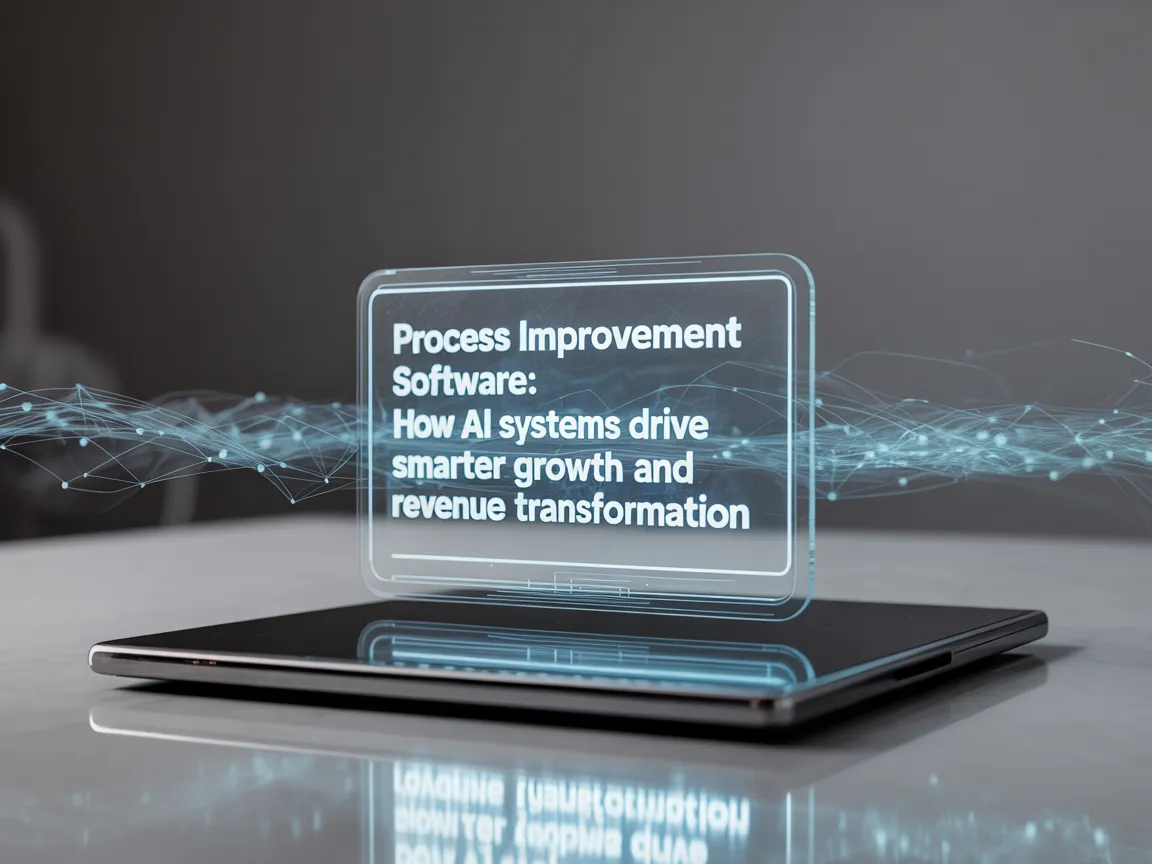
Top Process Improvement Software for Businesses
What Is Process Improvement Software?
Process improvement software is a category of tools designed to optimize business workflows, reduce operational friction, and drive better outcomes through automation, data analysis, and systematization. When enhanced by artificial intelligence, this software evolves beyond static process management into a dynamic infrastructure that learns, adapts, and improves in real time.
Why Process Inefficiency Holds Businesses Back
Many organizations are running on legacy systems, fragmented tools, and outdated SOPs. These inefficiencies show up in multiple ways:
Repetitive manual tasks
Communication silos between departments
Poor visibility into operational data
Reactive, not proactive, decision-making
Wasted employee time and underutilized skillsets
These bottlenecks don’t just slow down growth; they distort performance metrics, hinder customer experience, and inflate costs.
AI-Powered Process Improvement Software: A Game-Changer
By integrating AI into process improvement tools, companies can automate decision-making, predict bottlenecks, and create systems that adapt and optimize themselves. Here’s what AI unlocks:
Self-Learning Workflows
Systems that adjust based on historical data and outcomes
Intelligent routing of tasks based on priority and availability
Predictive Analytics
Anticipate bottlenecks before they happen
Forecast performance and resource needs
Natural Language Interfaces
Turn unstructured data (emails, chats, forms) into actionable insights
Enable non-technical teams to query and manipulate processes
Use Cases Across Industries
Manufacturing
AI-driven demand forecasting
Predictive maintenance scheduling
Healthcare
Intelligent patient scheduling
Claims automation and compliance tracking
Finance
Fraud detection and anomaly reporting
KYC (Know Your Customer) onboarding automation
E-Commerce & Retail
Inventory management optimization
Personalized customer service flows
Common Business Processes AI Can Transform
Employee onboarding
Customer support routing
Invoice processing
Procurement approvals
Product lifecycle management
If it follows a logic tree or repeats more than three times, it’s ripe for AI optimization.
The Worldie AI Approach: Design → Build → Release
At Worldie AI, we don’t just plug in tools. We architect systems.
1. Design
We start with a deep dive into your existing processes, mapping every step, identifying inefficiencies, and spotting automation-ready opportunities.
2. Build
Our engineering and strategy teams develop AI-enhanced systems that are:
Modular and scalable
Aligned to real business objectives
Built with training, data integration, and change management in mind
3. Release
We don’t launch and leave. Worldie ensures your team is equipped with ongoing support, metrics dashboards, and embedded optimization triggers that evolve with your operations.
The Strategic Impact of Smarter Systems
Deploying AI-enabled process improvement software drives high-leverage transformation:
40% faster task completion through intelligent routing
60% fewer manual handoffs
70% improvement in process transparency
3x ROI on operational tech investments within the first year
Challenges in AI Process Software Implementation
Let’s not pretend it’s plug-and-play. Here’s what needs to be addressed:
1. Data Fragmentation
Disparate systems mean scattered data. A successful AI system needs centralized, cleaned, and structured data.
2. Change Management
People resist change. Especially when it automates what they’ve always done manually. Clear communication and stakeholder buy-in is essential.
3. Integration Complexity
New systems must coexist with legacy platforms. Worldie AI specializes in interoperability and smart middleware solutions.
4. Skill Gaps
AI is powerful, but only as useful as your team’s ability to work with it. Training and upskilling are built into our deployment playbook.
Real-World Transformation: A Case in Point
Client: A mid-size logistics company with 120+ daily dispatches across Southeast Asia.
Problem: High error rate in scheduling, inefficient driver allocation, customer complaints on delivery windows.
Solution:
Built a predictive dispatch algorithm
Integrated GPS, traffic, and customer SLA data
Automated scheduling system with real-time updates
Outcome:
85% reduction in scheduling errors
35% faster dispatch cycles
50% increase in customer satisfaction rating in 3 months
Metrics That Matter
Worldie AI implements clear KPIs to quantify success:
Cycle time reduction (pre- vs. post-deployment)
% of manual vs. automated task completion
Number of system interventions per process
Operational cost savings vs. baseline
Is AI Process Improvement Right for Your Business?
Ask yourself:
Are we still doing repetitive tasks that follow logic trees?
Are decisions reactive instead of proactive?
Do we struggle with data visibility?
Is our operational cost growing faster than our revenue?
If any of these resonate, it’s time to audit your workflows with an AI lens.
Next Steps: Unlocking AI-Driven Efficiency with Worldie
We don’t just install software. We build intelligent infrastructure. If your team is looking to:
Scale faster without growing headcount
Transform operations into intelligent systems
Get real ROI from your tech stack
Then it’s time to partner with Worldie AI.
Frequently Asked Questions
1. How is process improvement software different when powered by AI?
Traditional tools follow static rules. AI-enhanced systems learn from data, make decisions in real time, and continuously improve processes without human intervention.
2. What makes Worldie AI’s approach unique?
We take a system design-first approach. Our focus is on strategic alignment, intelligent architecture, and sustainable scalability—not just tool implementation.
3. How long does it take to see results from AI process improvement?
Depending on complexity, many of our clients see measurable improvements within 30-90 days post-deployment. Long-term gains compound over time.
4. What kind of data do we need before starting?
We can work with what you have. During our design phase, we assess your current data environment and either clean, structure, or augment it to meet AI readiness standards.
5. Is this suitable for small businesses, or only large enterprises?
Both. While large organizations see scaled gains, SMBs benefit tremendously by eliminating manual workflows and making smarter decisions with fewer resources.
Ready to architect your revenue-transforming AI system? Let’s talk. Worldie AI helps you design, build, and launch intelligent infrastructure that powers predictable growth.

